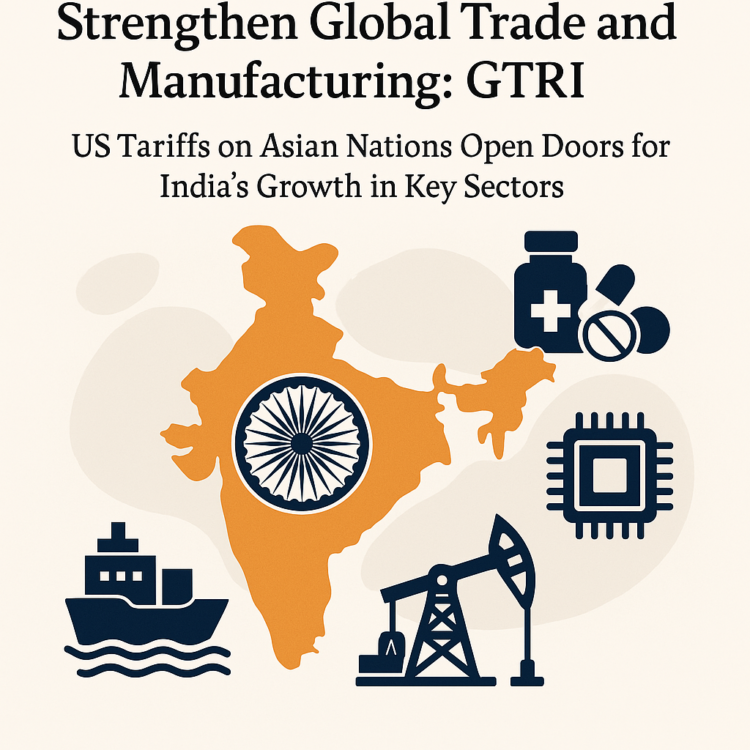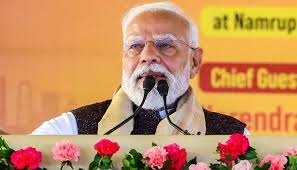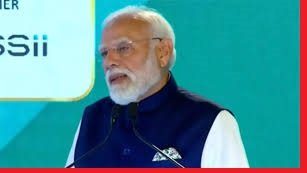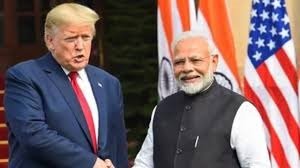India’s Strategic Opportunity in Global Trade as US Imposes High Tariffs on Asian Rivals
New Delhi, April (Economy India): India’s position in global trade and manufacturing is set for a significant boost as the United States enforces high retaliatory tariffs on key Asian economies, including China, Vietnam, Taiwan, Thailand, and Bangladesh. This move creates new avenues for Indian businesses to expand their global footprint and establish themselves as reliable alternatives in the international supply chain.
The Impact of US Tariffs on Asian Economies
The Global Trade Research Initiative (GTRI), an economic research institution, has highlighted that the recent US trade policy changes could shift global supply chain dynamics. The imposition of higher tariffs on imports from various Asian nations will create market gaps, giving India a competitive edge in multiple sectors.
The US decision, which raises import duties on several goods up to 27%, particularly impacts China’s manufacturing exports. Meanwhile, strategic products such as pharmaceuticals, semiconductors, and copper, as well as essential energy commodities like oil, gas, coal, and liquefied natural gas (LNG), have been exempted from these tariffs. This exemption aligns with India’s strengths, offering new trade and investment opportunities for the country.

India’s Rising Role in Global Manufacturing
With the US targeting China and other Asian competitors with steep tariffs, India can position itself as a stable and efficient alternative in global manufacturing. Sectors such as electronics, pharmaceuticals, and automobile components, where India has been gradually increasing its capacity, can benefit from this geopolitical shift.
Additionally, India’s push for self-reliance under initiatives like ‘Make in India’ and production-linked incentives (PLI) can gain traction as global companies seek to diversify their supply chains away from China. Investments in high-end technology sectors such as semiconductor manufacturing, renewable energy, and precision engineering could see a significant uptick.
Key Sectors That Stand to Benefit
Pharmaceutical Industry
India, already a leading supplier of generic drugs globally, can leverage the tariff changes to strengthen its exports to the US and Europe. With rising global healthcare demands, Indian pharmaceutical companies have an opportunity to expand their research, development, and manufacturing capabilities.
Semiconductor and Electronics
As global demand for semiconductors grows, India’s efforts to establish itself as a key player in chip manufacturing could accelerate. Government incentives and partnerships with major global tech firms will be crucial in making India a major semiconductor hub.
Energy and Natural Resources
With oil, gas, coal, and LNG exempt from new US tariffs, India has an opportunity to enhance its energy security and trade partnerships. Expanding domestic refining and energy processing capacities could further solidify India’s role in global energy markets.
Challenges and Strategic Measures Needed
While India stands to gain from the evolving global trade landscape, challenges such as infrastructure gaps, high logistics costs, and regulatory hurdles must be addressed. To maximize this opportunity, India must:
- Improve ease of doing business and streamline regulatory approvals.
- Enhance trade agreements and strengthen diplomatic ties with key global markets.
- Invest in infrastructure and logistics to facilitate faster exports.
- Encourage innovation and technology adoption in key sectors.

India’s Moment on the Global Stage
The shifting global trade dynamics present a unique window for India to establish itself as a formidable player in manufacturing and exports. With proactive policy support, strategic investments, and industry-driven innovation, India can leverage this opportunity to solidify its presence in the international market.
As global companies look for stable alternatives to China and other Asian nations, India’s business-friendly environment, skilled workforce, and growing industrial base could make it a preferred destination for manufacturing and trade partnerships.
(ECONOMYINDIA)












